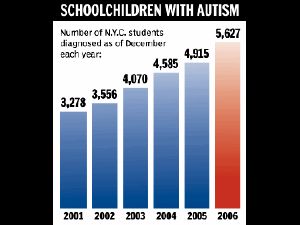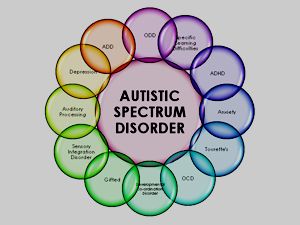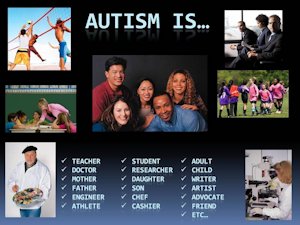The 3 Biggest Misconceptions About Autism
 | | Please don't take medical advice from this man |
I've been fascinated by autism since I was an undergraduate at the University of Florida, where for a brief time I nearly chose to become a professional psychologist. After learning all I could about how autism affects the brain, its genetic component, and what exactly autism is, I went on to study things like facilitated communication (a mostly pseudoscientific bit of wish fulfillment that features prominently in my novel, Thesea), which opened the door to a lifetime of skeptical thinking. It was in the skeptical community that I first learned of the anti-vaccination movement, a cause driven in large part by a belief that childhood vaccines--most notably the MMR vaccines--cause autism. Science has thoroughly debunked this myth and discredited the man most responsible for its popularity, and skeptical activists have done amazing work letting the public know about it.
Still, while belief in the vaccine-autism correlation is slowly on the wane, it is just one example of how deeply the general public misunderstands autism. Whole books have been written trying to correct the record (including The Autistic Brain by Temple Grandin, which I happen to be in the middle of as I write this and highly recommend to anyone who wishes to learn more), but I felt it was time to add my own small voice to the mix. I am not an expert, a psychologist, or a doctor, but I have quite a bit of familiarity with Autism Spectrum Disorder. As such, I feel it is important to simply address the basics that almost everybody seems to get wrong.
There is an Autism "Epidemic"
 | | Don't jump to conclusions |
It is widely held that autism rates are skyrocketting, that there is something out there making autism worse. While it is certainly true that the percentage of children diagnosed with autism is at an all time high and rising, that does not mean that the incidence of autism is on the rise. Given that "autism" wasn't even a diagnosis available in the first official DSM (the Diagnostic and Statistical Manual of Mental Disorders, the official guideline used by all mental health professionals to diagnose patients)--or the second--and that, when it did finally show up as a recognized disorder a few decades ago, its definition was incredibly narrow and specific, this shouldn't be a surprise. Over the years, more and more developmental delays have fallen into the autism category, which is now considered a spectrum. On top of that, there is a much greater awareness of autism in the medical community, as well as in the general public.
In other words, there are thousands of kids being diagnosed with autism today that would have been diagnosed as "learning disabled" a decade ago, if they were labelled as anything but a simple problem child. Still, it wouldn't be impossible for incidence rates to go up at the same time as diagnostic rates (as would be logical if there were an environmental cause that is coincidentally on the rise), so one has to look at the data very carefully to rule it out. Fortunately, science has been doing just that for quite some time now, and the vast majority of research has concluded that there is no evidence to support a belief in a growing autism epidemic.
Autism is a Single Disorder
 | | If the trend continues, all childhood behavioral problems will eventually fall into the spectrum (click image to enlarge) |
The diagnostic criteria for autism (now officially called Autistic Spectrum Disorder, or ASD) has gotten so broad in the last few years that it has swallowed virtually all known Pervasive Developmental Disorders (PDDs), such as Asperger Syndrome and Rett Syndrome, both of which were folded into the spectrum in the DSM-5 (published in 2013). While this has many benefits for early intervention, it has muddied the understanding in the general public of what autism actually is. Most people assume it is a single disorder, attributable to a single (albeit elusive) cause, and subject to a single prognosis that only varies in severity.
This is simply not true, however, and one must remember that the DSM is designed around symptoms, not underlying causes. We know the genetic basis for Rett Syndrome, for example, but knowing that doesn't yet change how it is treated (until we can design specific gene therapies for the MeCP2 gene). Essentially, what this means is that, for all intents and purposes, Rett Syndrome is just another name for autism, even though it is wildly different from autism disorders on the other end of the spectrum. This is why, for every clear example of a developmental defect in the brain that could be a cause for autism, there are hundreds of examples of ASD subjects who don't appear to show the same defect. In reality, there are probably as many different causes for ASD--genetic, biological, developmental, predispositional, and/or environmental--as there are deviations along the spectrum.
Every Autistic Person has Certain Behaviors
 | | It's a great film, but it doesn't really help give people a nuanced understanding of autism |
There are many behaviors associated with ASD that have become stereotypical. When most laymen picture an autistic, they imagine someone who can't make eye contact, barely speaks, screams when touched, makes odd body movements, and has a hidden, savant-like quality. When I studied developmental psychology in college and visited severe autistics at the school's psych ward, these were the kinds of kids and adults I saw in droves. While severe autism can often take this form, there is no behavior that is endemic to all autistics. For example, it is possible to have an autistic who makes lots of eye contact and is physically affectionate, but can't learn to read or write. It is just as possible to have an autistic who excells at reading and writing, but can't function if there is anybody within ten feet. Some autistics are on such an extreme end of the spectrum they can't communicate in any meaningful way, while others are charismatic, sociable, and well-spoken.
Of course, this goes hand in hand with the previous point--that autism isn't just one thing--but even if there were a single disorder, different people would find different ways--both physical and cognitive--to cope with it. Most autistics suffer from sensory problems--extreme aversions to certain sights, smells, sounds, etc.--but they tend to deal with these problems in novel, idiosyncratic ways (and many other autistics don't have the sensory issues at all). As for the savant thing, there is plenty of evidence to suggest that autism is linked to intelligence, but that doesn't mean every autistic kid is a budding Rain Man.
 | | ...Totally Human |
In the end, medical science is starting to finally get a handle on this thing called autism, and it is better understood among the experts than ever before. However, even as we are teasing out the finer points of diagnosis, treatment, and causation, the general public is still largely in the dark, only knowing of autism as this mysterious thing that happens to certain children at a young age. As long as we can avoid stigmatizing, stereotyping, misunderstanding, and misinforming, things can only get better for children with developmental problems and the parents who struggle every day to raise them.
As a final note, I will add a fourth misconception that I have encountered: the belief that autistic children can never lead a normal life. This is wrong for two reasons: (1) thanks to modern medicine, all but the most severe cases of autism--if caught sufficiently early--can be treated well enough that many autistics grow to be as healthy and happy as anyone else; and (2) there is no such thing as a "normal" life. Perhaps this is the cruelest misconception, the one that so frightens new parents and makes so many people paranoid about the fictional "epidemic." I can sympathize, but the news is good: autism is not a terminal disease, and many forms of it are not permanently debilitating. We should certainly be aware of it and should strive to understand it, but we shouldn't fear it, because that does a disservice to everyone who has to face it.
-e. magill 9/24/2015
|
|